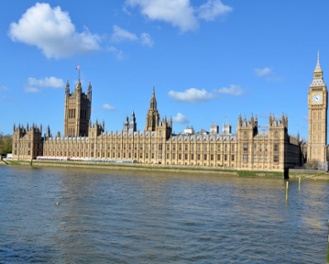Digital Skills Gap
Addressing the Digital Skills Gap in the Public Sector
27 April 2023 • 7 min read

Over the last decade, digital has evolved to touch every aspect of our daily lives. Tech wakes us up in the morning, it facilitates our work, our shopping, our travel, our communication. And it enables access to the public services and help we all need to live a fulfilling life. But with that digital evolution, expectations have also evolved. We’re used to accessing the things we want at the touch of a button; and we expect them to be efficient, intuitive and current. This presents a challenge for our public sector - because whilst dedicated to serving its citizens with accessible, user-centred and up to date services - a growing digital skills gap makes that difficult to do with expected levels of efficiency or innovation.
We recently called on Karl Dickman of DWP and Martin OBrian from ONS, to hear the biggest challenges the sector is facing, and to talk solutions with our Public Sector team. We’re summing up the highlights of that conversation now.
Only 4% of civil servants are in digital roles (compared to the average of 10% in the private sector)
Is this because less digital roles are needed in the public sector, or because public sector lacks the digital maturity to create the teams? Well, the first mistake people make is in comparing public and private sector at all, says the panel.
“Government is a very big and complex machine, and we require a wide and diverse range of skills and people to make that machine run. There’s amazing work being done across the board by people not ‘technically’ in digital roles - but they’re carrying out digital tasks daily.” says Digital Sociologist Lisa Talia Moretti.
This emphasises the critical need to define (and redefine) what we actually mean by ‘digital skills’ and how they look in practice.
“4% is probably the number of public sector workers who think they’re in a digital role, rather than those who actually are” says Karl Dickman.
Rather than shoehorning more digital roles into public sector for the optics against private, it’s about acknowledging the key roles people play in the strategy, planning and delivery of public sector products. “We’re no longer raising a generation of computer programmers. Everyone doesn’t need to learn how to code; digital upskilling should be role-appropriate, to help the government do its best work.”
Increasingly, government is digital, says AND's Public Sector Exec Jacob Farrugia. It’s no longer some separate thing, it’s the main touch point for our public sector services. And getting the most out of that in the long term means having everyone on board and educating them - particularly front line staff. They should know how our services work, how to fix things when needed, and most importantly how digital delivery actually works.
“We don’t do a ‘big bang’ build and design lifecycle now, and levels of frustration can build if front line workers think it’s just one and done.” says Karl Dickman.
The engagement of front life staff works both ways too; they’re really engaged with citizens and can add so much value, evolving our services and ultimately building better outcomes for our people.
62% of Public Sector employees believe that their organisation lacks the necessary digital skills to succeed in the future.
AND Digital’s extensive research into the skills gap brought up worrying statistics for the public sector, but among the myriad of challenges the sector faces, the stats weren’t a shock to our panel.
Learning new skills takes time, and in today’s economy, the currency of time comes with pressure to deliver - particularly when working with tax payers’ money. The evolution of skills in the Public Sector (equally seen in large private sector companies) is very much anchored by what’s being delivered ‘now’, meaning teams are always left playing catch up as a new challenge presents. Bridging that gap means taking a pause and a step back to scan the horizon for what’s coming, but that can be easier said than done, says DWP’s Karl Dickman.
“The government is risk averse when it comes to spending tax payers’ money, which is absolutely the right thing to do. But it's got to be done with a little bit of bravery and big picture thinking as well.”
With the pressure to deliver on the day to day, we commonly see training relegated to a “once a year” focus - which, as far as Jacob Farrugia is concerned, isn’t going to close Public Sector’s skills gap. It’s a great opportunity for gaining foundational knowledge, but that needs to be put into practice on real projects, to develop and nurture new skills in the real world.
“We need to look at upskilling holistically - It should be on-demand, accessible and tailored to specific needs; ideally built into a programme that understands the capability needs of individuals and teams.”
According to Jacob, that would be a lot easier to deliver alongside the day to day if the government put that onus on suppliers, and made upskilling a key part of contracts. This is key in how AND Digital works with Public Sector organisations, breaking upskilling programmes down to a 70/20/10 format. That’s:
10% in formal training
20% supported by coaching, mentoring, social learning and communities of practice
70% in practical project experience; to embed, nurture and share those skills.
How can public sector organisations collaborate, internally and cross-sector, to address the digital skills gap?
When we talk about the digital skills gap, both in public and private sector, it’s really important to acknowledge that it’s not one organisation’s responsibility to solve it, says Lisa Talia Moretti. This is a huge challenge that crosses all sectors, and it’s really critical that we work together.
Key to that collaboration is first aligning on what we mean by ‘digital skills’, and clarifying the actions we need to take to collectively tackle the growing gap. The UK has made some good progress in this area, laying out the five skills categories we all need for life and work, as part of the Essential Digital Skills Framework. The framework sets a digital capability baseline for things like cross-communicating, problem solving and being safe online, to be applied by charities, government departments, employers and individuals. The problem is, this framework hasn’t been updated since 2019, meaning it completely misses the toll the pandemic took on our approach to digital, as well as the many technological advances we’ve made over the last 4 years. Whilst Lisa stresses the need for frameworks like these to be constantly reviewed and iterated, the question remains open: who owns and leads in that ongoing iteration?
Looking at turning guidance into action, Martin OBrian spoke about the DDaT Academy launched at ONS last summer, which is helping students and apprentices build digital and data expertise on the job. This has been hugely successful, but Martin acknowledges that the interest in DDaT Academy could filter through to help other departments.
“We’re offering around 14 posts a year in the Academy, but we’re garnering 200+ applications. If other departments set up their own undergraduate programmes, we could share that overflow of interest and enthusiasm, as well as our best practice and learnings for a collective long-term strategy.”
Much like the DDaT Academy there’s lots of great progress being made to tackle the skills gap across the public and private sector - but it’s mostly in closed pockets. We’re not collaborating enough, meaning work is often being duplicated without any new value added, leading to inefficiency and wasted resources.
“We all have our own training, but there are really only so many ways you can “do” a particular discipline. What value are we getting out of someone creating another new training course in, say, user research?” asks Jacob Farrugia.
What he proposes instead is a model like open sourcing. We’re used to sharing and reusing code, technical solutions and design patterns, why can’t we apply this to digital skills too? Forming a community, with everyone contributing their knowledge and insights to one thing, making it as in-depth and innovative as possible.
The takeaway? If public sector is to make progress in closing the digital skills gap, organisations and departments must stop working in silos. We need to move towards a culture of sharing and collaboration, to avoid duplicating efforts and instead boost efficiency and progress in innovation. Departments also need to shout more about the success and progress already being made, to help others learn what the good (and the possible) looks like.
Whilst budgets and delivery pressures can dominate the day to day, public sector organisations need the bravery (and critically, the support from private sector partners) to step back and invest in the skills needed for the long term. Ultimately, whilst it may feel like we can't afford to do something about the skills gap, with £50bn a year in growth at risk for the UK, we can't afford not to.
Interested in getting involved in Jacob’s digital skills community? You can touch base with him here.




